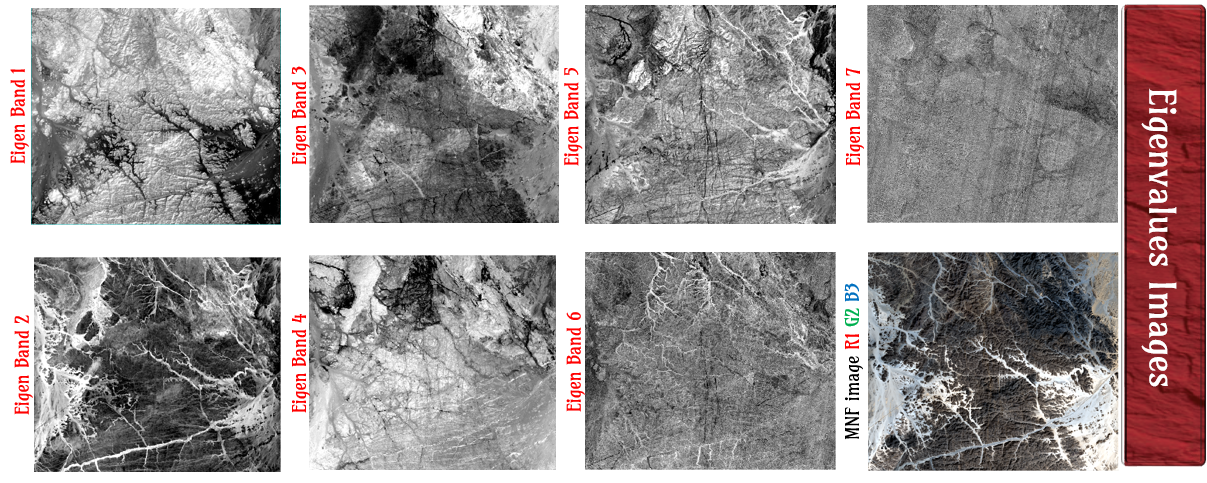Subset of your image that only
includes the areas our
are interested in. This saves
disk space and processing time. Some software packages refer to this process as
subsetting while others use the term
clipping. Most raster data can be subset using XY coordinates, vector files or
user created Regions of Interest (ROI). This process always creates a new
dataset that only contains your data subset.
Minimum noise fraction (MNF) transformation is used to show the
variation between bands in an image. This is a statistical method
which works out differences
in an image based on pixel DNs in various bands. MNF determines the inherent dimensionality of image data, to segregate noise
in the data, and
to reduce the computational requirements for subsequent
processing. This step is often completed as a
precursor to other types of analysis. Basically it is a way of simplifying the
data. The MNF transform is essentially two principal component transformations.
The first transformation, based on an estimated noise covariance matrix, decorrelates and rescales the noise in the
data. [2]
This first step results in
transformed data in which the noise has unit variance and no band-to-band
correlations. The second step is a standard principal components transformation
which creates several new bands containing the majority of the information. By
using only the coherent portions, the noise is separated from the data, thus
improving spectral processing results. Once applying MNF technique, on the 7
bands images TM (After being calibrated in reflectance mode), we will have like
result 7 new bands images MNF. The image pixels are presented by eigenvalues.
In examining the eigenvalues it can be seen that the first MNF bands ( 1 and 2) have the highest values while the
remaining bands have consistent low values. It is the first two bands with the
large values that contain most of the information and it is these bands that
correspond to MNF images. The remaining low value bands (3 and under for
example) are seen as noise. The images show the information compressed into
only a few bands. The redundancy of the data is eliminated and noise is also
removed. The result are more interpretable images. You could say that the data
has been simplified or the dimensionality has been reduced.
Optimum Index Factor (OIF) is a statistic
value that can be used to select the optimum combination of three bands in a
satellite image with which you want to create a color composite. The optimum
combination of bands out of all possible 3-band combinations is the one with
the highest amount of 'information' (= highest sum of standard deviations),
with the least amount of duplication (lowest correlation among band pairs). The
limitation of the OIF calculation is that, the best combination for conveying
the overall information in a large scene may not be the best combination for
conveying the specific information desired by the image analysis. This from
experience in most cases is reasonable and that also depends on the type of
study. The aim of this study is to use OIF technique to rank all the possible
three-band combinations with the best favorable for geological mapping of
El-Beda Prospect. [3] Based on the
results obtained from OIF, the combination 7, 2 and
1 shows the
highest value of OIF with the first rank. This
band combination has the most information with
the least amount
of duplication so that the boundaries
between rock units and other geological features are very clear.
[2] J.W. , Boardman & F.A. , Kruse ;
Thematic Coference on Geologic Remote Sensing, Environmetal Research Institute of Michigan, Ann Arbor, MI, I: 407-418;
(1994);
"Automated
spectral analysis: A geologic example using AVIRIS data,
noth
Grapevine Mountais, Nevada".
[3] Ali M. Qaid and H.T. Basavarajappa ; American-Eurasian Journal of
Scientific Research 3 (1): 84-91, 2008 ISSN 1818-6785"Application of
Optimum Index Factor Technique to Landsat-7 Data for Geological Mapping
of North East of Hajjah, Yemen".















What an awesome written by you! I am too glad to read this kind of informative blog article. Thanks to sharing this with us, really thank you!!!!!!
ReplyDeleteDubai VPS Server
Mindblowing, This is an amazing superb article Keep Sharing this...
ReplyDeleteThanks a lot!!!!
Germany VPS Hosting